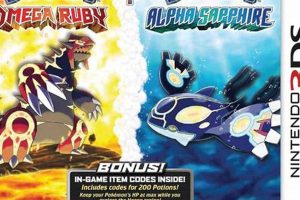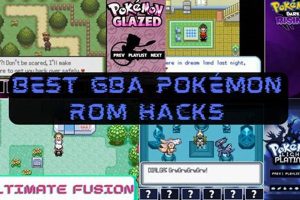A “Pokemon Dungeon” game distributed as a Game Boy Advance ROM file represents a digital copy of a role-playing video game from the “Pokemon Mystery Dungeon” series, playable on a Game Boy Advance emulator. These files, typically in the .gba format, enable users to experience the game on computers or other devices capable of running GBA emulation software.
The significance of these ROM files lies in their accessibility and preservation of classic gaming experiences. They allow individuals to revisit or discover titles from the Game Boy Advance era, extending the lifespan of these games beyond their original hardware. Moreover, this method facilitates accessibility for players who may not have access to original cartridges or a functioning GBA console. The ability to play these games on modern devices is a key benefit, preserving gaming history.
The following sections will delve into aspects such as acquiring these files, legal considerations, and the technical requirements for proper functionality. Understanding these elements is crucial for users seeking to experience these classic titles responsibly and effectively.
Tips for Playing “Pokemon Dungeon” GBA ROMs
Ensuring a satisfactory experience with a “Pokemon Dungeon” title stored as a GBA ROM involves several considerations. Optimization of emulator settings and responsible sourcing of the file are crucial for avoiding technical issues and potential legal ramifications.
Tip 1: Selecting a Reputable Emulator: Multiple GBA emulators exist, each with varying degrees of compatibility and performance. Researching and choosing a well-regarded emulator, such as VisualBoyAdvance or mGBA, can significantly improve the gameplay experience. Verification of emulator settings is also important.
Tip 2: Verifying ROM File Integrity: Corruption within the file can lead to crashes, glitches, or an inability to load the game. Before initiating gameplay, confirm the file’s integrity by comparing its checksum against known values, if available. Redownload from a different source if corruption is suspected.
Tip 3: Adjusting Emulator Settings: Experiment with emulator settings like frame skip, rendering methods, and audio output. Modifications can potentially resolve performance issues, particularly on older or less powerful hardware. Consult emulator documentation for detailed configuration options.
Tip 4: Saving Frequently: Emulators are not immune to crashes. Implement a frequent save strategy using the emulator’s save state feature in addition to the game’s built-in save system. This precaution minimizes potential data loss.
Tip 5: Utilizing Cheat Codes with Caution: While cheat codes can enhance the gameplay experience, excessive use may lead to instability or unforeseen consequences. Employ cheat codes judiciously and save the game before activating them to revert if problems arise.
Tip 6: Researching Compatibility Issues: Certain “Pokemon Dungeon” releases might exhibit specific compatibility issues with particular emulators or hardware configurations. Online forums and communities often contain information regarding common problems and potential solutions.
By adhering to these recommendations, users can improve the likelihood of enjoying a stable and enjoyable experience with a “Pokemon Dungeon” title distributed in ROM format.
The following section addresses legal considerations related to obtaining and utilizing these game files.
1. Emulation Software Selection
The choice of emulation software directly impacts the functionality and overall experience of playing “Pokemon Dungeon” Game Boy Advance ROMs. Different emulators possess varying degrees of accuracy in replicating the original Game Boy Advance hardware. Inaccurate emulation can lead to graphical glitches, audio distortion, control input lag, or even complete game crashes, rendering the title unplayable. For example, a poorly optimized emulator might struggle to render the detailed sprites and environments of “Pokemon Dungeon: Red Rescue Team” or “Pokemon Dungeon: Blue Rescue Team,” resulting in a visually degraded experience. Conversely, a well-chosen emulator ensures faithful recreation of the game’s intended presentation.
Furthermore, emulator features such as save state support, cheat code functionality, and screen scaling options enhance the gameplay experience. Save states permit users to instantly save and load progress at any point in the game, offering a level of convenience not available on the original hardware. Cheat codes, though controversial, provide the ability to modify gameplay. Scalable display allows modification of the games visual properties to better suit various resolutions. The availability and quality of these features are directly determined by the emulator selected. An emulator lacking robust save state support increases the risk of losing progress due to unexpected crashes, while a limited feature set restricts the user’s ability to customize the experience.
In summary, the selection of an appropriate emulator is paramount for a positive experience when utilizing a Game Boy Advance ROM. Selecting a well-regarded and accurate emulator ensures the title functions as intended, free from major glitches or performance issues. Failure to do so can result in a compromised experience, diminishing the enjoyment and potential of “Pokemon Dungeon” titles. Thus, research into emulator compatibility and features should precede any attempt to play a Game Boy Advance ROM file.
2. File Source Legitimacy
The legitimacy of the source from which a “Pokemon Dungeon” Game Boy Advance ROM file is obtained directly impacts the security and integrity of the user’s system and the gaming experience. Illegitimate sources frequently harbor malware, including viruses, trojans, and ransomware, disguised as game files. Downloading such a file can result in system compromise, data theft, or financial loss. A corrupted or modified ROM obtained from an untrustworthy source may also introduce glitches, rendering the game unplayable or causing unpredictable behavior that detracts from the intended experience. For instance, a ROM downloaded from a peer-to-peer network could contain malicious code designed to exploit vulnerabilities in the user’s operating system, whereas a reputable source typically scans files for such threats before distribution.
Furthermore, obtaining a “Pokemon Dungeon” GBA ROM from an illegitimate source often constitutes copyright infringement. Distributing and downloading copyrighted material without authorization is illegal and can expose the user to legal repercussions, including fines and potential lawsuits from the copyright holder, typically Nintendo in the case of Pokemon titles. Choosing legitimate avenues for accessing the game, such as purchasing a used cartridge or exploring legally sanctioned digital distribution methods (if available), ensures compliance with copyright law and avoids potential legal challenges. A hypothetical user downloading a ROM from a site known for distributing pirated software would be at significant risk of both malware infection and legal action, compared to a user who utilizes a verified digital storefront (were such a method to exist for GBA titles).
In conclusion, the legitimacy of the ROM file source is a critical determinant of the user’s safety and legal standing when engaging with “Pokemon Dungeon” Game Boy Advance games. Prioritizing reputable and verified sources mitigates the risks of malware infection, copyright infringement, and compromised gameplay experiences. Diligence in verifying the source is a fundamental aspect of responsible ROM usage.
3. ROM Integrity Verification
The practice of ROM integrity verification is paramount when dealing with “pokemon dungeon gba rom” files. This process ensures that the digital file matches the original, unaltered game data, mitigating risks associated with corruption or malicious modification.
- Checksum Validation
Checksum validation involves calculating a unique digital fingerprint of the ROM file and comparing it against a known, verified checksum for the original game. Tools like MD5 or SHA-1 hash generators are employed. If the checksums do not match, it indicates the file has been altered or corrupted. For example, a “pokemon dungeon gba rom” file with an incorrect checksum might exhibit glitches, crashes, or even contain malicious code. Correct checksum matching guarantees the authenticity of the original game, reducing chances of compromised gameplay.
- Header Analysis
The ROM header contains critical metadata about the game, including its title, publisher, and internal identifiers. Header analysis involves examining this data to verify its consistency with the expected values for a genuine “pokemon dungeon gba rom”. Discrepancies in the header can indicate tampering or incorrect file conversions. For instance, a modified header might misrepresent the game title or alter its save file structure, leading to incompatibility issues. Properly analyzing header assures original product and function.
- Data Structure Examination
Game Boy Advance ROMs have a specific data structure, organizing code, graphics, and audio assets in a predictable manner. Examining this data structure can reveal inconsistencies or irregularities that suggest tampering. For example, a “pokemon dungeon gba rom” with injected code might have unexpected data segments or altered file offsets. Proper data structure checking leads to the recognition of the altered game.
- Emulator Testing
While not a direct form of verification, testing the “pokemon dungeon gba rom” file in a reputable GBA emulator can indirectly reveal integrity issues. A corrupted or modified ROM might exhibit unusual behavior, graphical glitches, or crashes when run in the emulator. Careful observation of gameplay can highlight problems that checksum validation alone might miss. For example, if characters are missing textures or the game crashes upon reaching a specific point, it may indicate corrupted data.
These facets of ROM integrity verification are essential for ensuring a safe and authentic experience with “pokemon dungeon gba rom” files. By implementing these checks, users can minimize the risks associated with corrupted or malicious ROMs and enjoy the game as intended.
4. Copyright Law Adherence
Copyright law adherence is a critical consideration when engaging with “pokemon dungeon gba rom” files. Copyright law protects the intellectual property rights of the game developers and publishers, typically encompassing the game’s code, artwork, music, and overall design. Failure to adhere to these laws can result in legal repercussions.
- Unauthorized Distribution
Unauthorized distribution of “pokemon dungeon gba rom” files constitutes a direct infringement of copyright. Making the game available for download without the explicit permission of the copyright holder is illegal. For example, uploading a ROM to a file-sharing website or distributing it via peer-to-peer networks violates copyright law. The copyright holder possesses the exclusive right to distribute their work, and unauthorized distribution undermines their ability to profit from their creation.
- Unauthorized Downloading
Downloading “pokemon dungeon gba rom” files from unauthorized sources is also a copyright infringement. Even if the user is not distributing the file, simply possessing an illegally obtained copy of the game violates copyright law. An individual downloading a ROM from a website known for distributing pirated software is in violation of copyright. Exceptions may exist for archival purposes under specific fair use or fair dealing provisions, but these are generally limited and require owning a legitimate copy of the game.
- Emulation as a Secondary Consideration
While emulation itself is generally legal, its legality is contingent upon the source of the ROM file. Using an emulator to play a “pokemon dungeon gba rom” file obtained legally (e.g., by creating a personal backup from a legitimately owned cartridge) is typically permissible. However, using an emulator with an illegally obtained ROM file remains a copyright infringement. The legality of the emulator does not negate the illegality of possessing or using an unlawfully acquired ROM.
- Consequences of Infringement
Engaging in copyright infringement related to “pokemon dungeon gba rom” files can lead to various legal consequences, including civil lawsuits and criminal charges. Copyright holders can pursue legal action against individuals or entities involved in the unauthorized distribution or downloading of their copyrighted works, seeking monetary damages and injunctive relief. The severity of the penalties depends on the scale and nature of the infringement, but even individual instances of unauthorized downloading can result in significant fines.
Copyright law adherence is therefore an indispensable aspect of engaging with “pokemon dungeon gba rom” files. Users must ensure they are obtaining and using these files legally to avoid potential legal repercussions and to respect the intellectual property rights of the copyright holders. The act of downloading ROM requires caution.
5. Hardware Compatibility Evaluation
Hardware Compatibility Evaluation is a critical process when utilizing a “pokemon dungeon gba rom” file, as the Game Boy Advance titles were originally designed for specific hardware configurations. Emulating these games on modern devices necessitates a careful assessment of hardware capabilities to ensure a stable and enjoyable experience.
- Processor Performance
Emulation demands substantial processing power, as the host device must translate the original Game Boy Advance code into instructions executable on its own architecture. Insufficient processor performance can result in slowdown, stuttering, or even an inability to run the game at all. For example, attempting to emulate “Pokemon Dungeon: Explorers of Sky” on a low-end smartphone may lead to significant frame rate drops, rendering the game unplayable. Proper testing of CPU capability and processing capacity is essential to avoid this issue.
- Memory Allocation
Game Boy Advance ROMs require a certain amount of system memory (RAM) to function correctly. Insufficient memory can lead to crashes or instability. Furthermore, the operating system’s memory management can impact emulator performance. An older computer with limited RAM may struggle to load and run a “pokemon dungeon gba rom” smoothly, especially if other applications are running concurrently. A sufficient random access memory size and proper dynamic assignment will help mitigate challenges.
- Graphics Processing Unit (GPU) Capabilities
While Game Boy Advance graphics are relatively simple by modern standards, the emulator still requires a capable GPU to render the game accurately and efficiently. Inadequate GPU performance can result in graphical glitches, incorrect color rendering, or slowdown. For example, using an integrated graphics card with limited processing power may lead to visual artifacts or reduced frame rates. A dedicated graphics rendering engine with up-to-date driver will help to fix the potential bottleneck.
- Operating System Compatibility
The emulator must be compatible with the host device’s operating system. Incompatibility can lead to a range of issues, including crashes, instability, or an inability to install or launch the emulator. Older emulators may not function correctly on modern operating systems, requiring the use of compatibility modes or alternative software. Testing with multiple OS instances before final deployment is helpful.
These facets of hardware compatibility evaluation are fundamental to ensuring a positive gaming experience with “pokemon dungeon gba rom” files. By carefully assessing the host device’s capabilities and selecting an emulator that is well-suited to the hardware, users can maximize performance and minimize the risk of encountering technical issues. Careful consideration needs to be taken regarding the various OS support.
Frequently Asked Questions Regarding “Pokemon Dungeon GBA ROM” Files
This section addresses common inquiries concerning the acquisition, usage, and legal implications associated with “Pokemon Dungeon” titles distributed as Game Boy Advance ROM files.
Question 1: What constitutes a “pokemon dungeon gba rom” file?
A “pokemon dungeon gba rom” file is a digital copy of a “Pokemon Mystery Dungeon” video game originally released for the Game Boy Advance. These files, typically in .gba format, are intended for use with GBA emulation software on computers or other compatible devices.
Question 2: Is obtaining a “pokemon dungeon gba rom” file legally permissible?
The legality of obtaining such a file depends on the source and method of acquisition. Downloading a ROM from an unauthorized source is generally considered copyright infringement, even if the user owns the original game cartridge. Creating a personal backup from a legitimately owned cartridge may be permissible in some jurisdictions, but specific laws vary.
Question 3: What are the potential risks associated with downloading “pokemon dungeon gba rom” files?
Downloading ROM files from untrustworthy sources carries a significant risk of malware infection, including viruses, trojans, and other malicious software. Furthermore, such files may be incomplete or corrupted, leading to gameplay issues or system instability. Verifying the file’s integrity using checksums is recommended.
Question 4: What hardware and software are required to play a “pokemon dungeon gba rom” file?
Playing a “pokemon dungeon gba rom” file requires a compatible GBA emulator and a device capable of running the emulator. The specific hardware requirements depend on the emulator’s demands, but generally, a reasonably modern computer or mobile device with sufficient processing power and memory is needed.
Question 5: How can one verify the integrity of a downloaded “pokemon dungeon gba rom” file?
ROM integrity can be verified by comparing the file’s checksum (e.g., MD5 or SHA-1 hash) against a known, verified checksum for the original game. Checksum values can often be found on reputable gaming websites or in online forums. A mismatch indicates that the file has been altered or corrupted.
Question 6: What are the potential legal consequences of distributing “pokemon dungeon gba rom” files?
Distributing “pokemon dungeon gba rom” files without authorization constitutes copyright infringement and can lead to legal action from the copyright holder. Penalties may include monetary fines, damages, and potentially criminal charges, depending on the scale and nature of the infringement.
Responsible acquisition and usage of a “pokemon dungeon gba rom” necessitates understanding these concerns. Adherence to ethical and legal guidelines is advised.
The subsequent section offers best practices for emulating a “pokemon dungeon gba rom” for a better user experience.
Conclusion
The preceding discussion elucidates various facets pertaining to “pokemon dungeon gba rom” files. Attention has been given to acquisition methods, encompassing both legal and illicit avenues. Detailed analysis of ROM integrity verification, copyright law, and hardware compatibility has been presented. A comprehensive understanding of these elements is crucial for individuals seeking to engage with these digital recreations of Game Boy Advance titles.
Responsible and informed utilization of “pokemon dungeon gba rom” files remains paramount. Adherence to copyright regulations and diligent verification of file integrity are essential for mitigating legal and security risks. A commitment to ethical practices ensures the preservation of gaming history while respecting intellectual property rights and fostering a safe digital environment. Users should perform due diligence before running “pokemon dungeon gba rom”.







